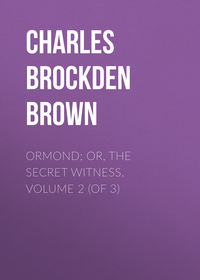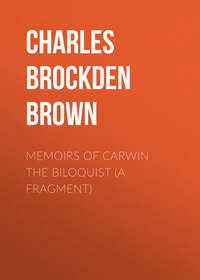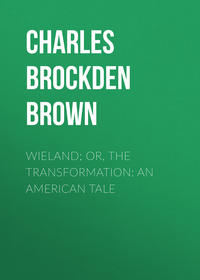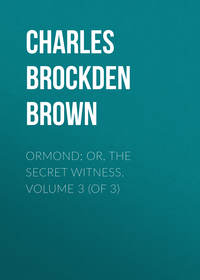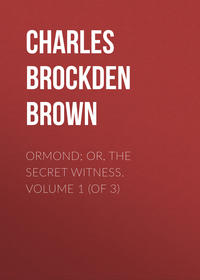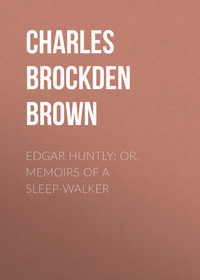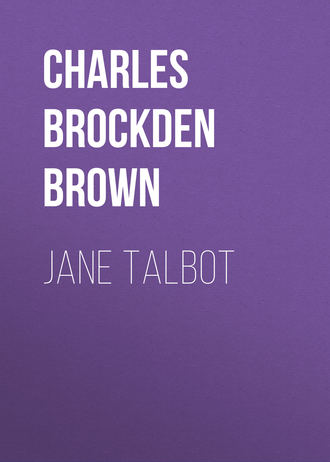 полная версия
полная версияJane Talbot
No. Her happiness requires me to be blotted out of existence. Let me unfold myself to myself; let me ask my soul, Canst thou wish to be rejected, renounced, and forgotten by Jane? Does it please thee that her happiness should be placed upon a basis absolutely independent of thy lot? Canst thou, with a true and fervent zeal, resign her to her mother?
I can. I do.
I wish I had words, my friend: yet why do I wish for them? Why sit I here, endeavouring to give form, substance, and duration to images to which it is guilty and opprobrious to allow momentary place in my mind? Why do I thus lay up, for the few that love me, causes of affliction?
Yet perhaps I accuse myself too soon. The persuasion that I have one friend is sweet. I fancy myself talking to one who is interested in my happiness; but this shall satisfy me. If fate impel me to any rash and irretrievable act, I will take care that no legacy of sorrow shall be left to my survivors. My fate shall be buried in oblivion. No busy curiosity, no affectionate zeal, shall trace the way that I have gone. No mourning footsteps shall haunt my grave,
I am, indeed, my friend–never, never before, spiritless and even hopeless as I have sometimes been, have my thoughts been thus gloomy. Never felt I so enamoured of that which seems to be the cure-all.
Often have I wished to slide obscurely and quietly into the grave; but this wish, while it saddened my bosom, never raised my hand against my life. It made me willingly expose my safety to the blasts of pestilence; it made me court disease; but it never set my imagination in search after more certain and speedy means.
Yet I am wonderfully calm. I can still reason on the folly of despair. I know that a few days, perhaps a few hours, will bring me some degree of comfort and courage; will make life, with all its disappointments and vexations, endurable at least.
Would to Heaven I were not quite alone! Left thus to my greatest enemy, myself, I feel that I am capable of deeds which I fear to name.
A few minutes ago I was anxious to find Miss Jessup; to gain another interview with Mrs. Fielder. Both the one and the other have left the city. Jane's dwelling is deserted. Shortly after I left it, they set out upon their journey, and Miss Jessup–no doubt, to avoid another interview with me–has precipitately withdrawn into the country.
I shall not pursue their steps. Let things take their course. No doubt, a lasting and effectual remorse will, some time or other, reach the heart of Miss Jessup, and this fatal error will be rectified. I need not live, I need not exert myself, to hasten the discovery. I can do nothing.
Letter LII
To Mrs. FielderPhiladelphia, December 16.
It is not improbable that, as soon as you recognise the hand that wrote this letter, you will throw it unread into the fire; yet it comes not to soothe resentment, or to supplicate for mercy. It seeks not a favourable audience. It wishes not–because the wish would be chimerical–to have its assertions believed. It expects not even to be read. All I hope is, that, though neglected, despised, and discredited for the present, it may not be precipitately destroyed or utterly forgotten. The time will come when it will be read with a different spirit.
You inform me that Miss Jessup has denied her letter, and imputes to me the wickedness of forging her name to a false confession. You are justly astonished at the iniquity and folly of what you deem my artifice. This astonishment, when you look back upon my past misconduct, is turned from me to yourself; from my folly to your own credulity, that was, for a moment, made the dupe of my contrivances.
I can say nothing that will or that ought--that is my peculiar misery,–that ought, considering the measure of my real guilt, to screen me from this charge. There is but one event that can shake your opinion. An event that is barely possible; that may not happen, if it happen at all, till the lapse of years; and from which, even if I were alive, I could not hope to derive advantage. Miss Jessup's conscience may awaken time enough to enable her to undeceive you, and to repent of her second as well as her first fraud.
If that event ever takes place, perhaps this letter may still exist to bear testimony to my rectitude. Thrown aside and long forgotten, or never read, chance may put it in your way once more. Time, that soother of resentment as well as lessener of love, and the perseverance of your daughter in the way you prescribe, may soften your asperities even towards me. A generous heart like yours will feel an emotion of joy that I have not been quite as guilty as you had reason to believe.
Give me leave, madam, to anticipate that moment. The number of my consolations are few. Your enmity I rank among my chief misfortunes, and the more so because I deserve much, though not all your enmity. The persuasion that the time will come when you will acquit me of this charge, is, even now, a comforter. This is more desirable to me, since it will relieve your daughter from one among the many evils in which she has been involved by the vices and infirmities of
H. COLDEN.
Letter LIII
To James MontfordPhiladelphia, December 17.
I sought relief a second time to my drooping heart, by a walk in the fields. Returning, I met Harriet Thomson in the street. The meeting was somewhat unexpected. Since we parted at Baltimore, I imagined she had returned to her old habitation in Jersey. I knew she was pretty much a stranger in this city. Night had already come on, and she was alone. She greeted me with visible satisfaction; and, though I was very little fit for society, especially of those who loved me not, I thought common civility required me to attend her home.
I never saw this woman till I met her lately at her brother's bedside. Her opinions of me were all derived from unfavourable sources, and I knew, from good authority, that she regarded me as a dangerous and hateful character. I had even, accidentally, heard her opinion of the affair between Jane and me. Jane was severely censured for credulity and indiscretion, but some excuse was allowed to her on the score of the greater guilt that was placed to my account.
Her behaviour, when we first met, was somewhat conformable to these impressions. A good deal of coldness and reserve in her deportment, which I was sometimes sorry for, as she seems an estimable creature; meek, affectionate, tender, passionately loving her brother; convinced, from the hour of her first arrival, that his disease was a hopeless one, yet exerting a surprising command over her feelings, and performing every office of a nurse with skill and firmness.
Insensibly the distance between us grew less. A participation in the same calamity, and the counsel and aid which her situation demanded, forced her to lay aside some of her reserve. Still, however, it seemed but a submission to necessity; and all advances were made with an ill grace.
She was often present when her brother turned the discourse upon religious subjects. I have long since abjured the vanity of disputation. There is no road to truth but by meditation,-severe, intense, candid, and dispassionate. What others say on doubtful subjects, I shall henceforth lay up as materials for meditation.
I listened to my dying friend's arguments and admonitions, I think I may venture to say, with a suitable spirit. The arrogant or disputatious passions could not possibly find place in a scene like this. Even if I thought him in the wrong, what but brutal depravity could lead me to endeavour to shake his belief at a time when sickness had made his judgment infirm, and when his opinion supplied his sinking heart with confidence and joy?
But, in truth, I was far from thinking him in the wrong. At any time I should have allowed infinite, plausibility and subtlety to his reasonings, and at this time I confessed them to be weighty. Whether they were most weighty in the scale could be only known by a more ample and deliberate view and comparison than it was possible, with the spectacle of a dying friend before me, and with so many solicitudes and suspenses about me respecting Jane, to bestow on them. Meanwhile, I treasured them up, and determined, as I told him, that his generous efforts for my good should not be thrown away.
At first, his sister was very uneasy when her brother entered on the theme nearest to his friendly heart. She seemed apprehensive of dispute and contradiction. This apprehension was quickly removed, and she thenceforth encouraged the discourse. She listened with delight and eagerness, and her eye, frequently, when my friend's eloquence was most affecting, appealed to me. It sometimes conveyed a meaning far more powerful than her brother's lips, and expressed at once the strongest conviction of the truth of his words, and the most fervent desire that they might convince me. Her natural modesty, joined, no doubt, to her disesteem of my character, prevented her from mixing in discourse.
She greeted me at this meeting with a frankness which I did not expect. A disposition to converse, and attentiveness to the few words that I had occasion to say, were very evident. I was just then in the most dejected and forlorn state imaginable. My heart panted for some friendly bosom, into which I might pour my cares. I had reason to esteem the purity, sweetness, and amiable qualities of this good girl. Her aversion to me naturally flowed from these qualities, while an abatement of that aversion was flattering to me, as the triumph of feeling over judgment.
I should have left her at the door of her lodgings, but she besought me to go in so earnestly, that my facility, rather than my inclination, complied. She saw that I was absent and disturbed. I never read compassion and (shall I say?) good-will in any eye more distinctly than in hers.
The conversation for a time was vague and trite. Insensibly, the scenes lately witnessed were recalled, not without many a half-stifled sigh and ill-disguised tear on her part. Some arrangements as to the letters and papers of her brother were suggested. I expressed a wish to have my letters restored to me; I alluded to those letters, written in the sanguine insolence of youth and with the dogmatic rage upon me, that have done me so much mischief with Mrs. Fielder. I had not thought of them before; but now it occurred to me that they might as well be destroyed.
This insensibly led the conversation into more interesting topics. I could not suppress my regret that I had ever written some things in those letters, and informed her that my view in taking them back was to doom them to that oblivion from which it would have been happy for me if they never had been called.
After many tacit intimations, much reluctance and timidity to inquire and communicate, I was greatly surprised to discover that these letters had been seen by her; that Mrs. Fielder's character was not unknown to her; that she was no stranger to her brother's disclosures to that lady.
Without directly expressing her thoughts, it was easy to perceive that her mind was full of ideas produced by these letters, by her brother's discourse, and by curiosity as to my present opinions. Her modesty laid restraint on her lips. She was fearful, I supposed, of being thought forward and impertinent.
I endeavoured to dissipate these apprehensions. All about this girl was, on this occasion, remarkably attractive. I loved her brother, and his features still survive in her. The only relation she has left is a distant one, on whose regard and protection she has therefore but slender claims. Her mind is rich in all the graces of ingenuousness and modesty. The curiosity she felt respecting me made me grateful as for a token of regard. I was therefore not backward to unfold the true state of my mind.
Now and then she made seasonable and judicious comments on what I said. Was there any subject of inquiry more momentous than the truth of religion? If my doubts and heresies had involved me in difficulties, was not the remedy obvious and easy?. Why not enter on regular discussions, and, having candidly and deliberately formed my creed, adhere to it frankly, firmly, and consistently? A state of doubt and indecision was, in every view, hurtful, criminal, and ignominious. Conviction, if it were in favour of religion, would insure me every kind of happiness. It would forward even those schemes of temporal advantage on which I might be intent. It would reconcile those whose aversion arose from difference of opinion; and in cases where it failed to benefit my worldly views, it would console me for my disappointment.
If my inquiries should establish an irreligious conviction, still, any form of certainty was better than doubt. The love of truth and the consciousness of that certainty would raise me above hatred and slander. I should then have some kind of principle by which to regulate my conduct; I should then know on what foundation to build. To fluctuate, to waver, to postpone inquiry, was more criminal than any kind of opinion candidly investigated and firmly adopted, and would more effectually debar me from happiness. At my age, with my talents and inducements, it was sordid, it was ignoble, it was culpable, to allow indifference or indolence to slacken my zeal.
These sentiments were conveyed in various broken hints and modest interrogatories. While they mortified, they charmed me; they enlightened me while they perplexed. I came away with my soul roused by a new impulse. I have emerged from a dreary torpor, not indeed to tranquillity or happiness, but to something less fatal, less dreadful.
Would you think that a ray of hope has broken in upon me? Am I not still, in some degree, the maker of my fortune? Why mournfully ruminate on the past, instead of looking to the future? How wretched, how criminal, how infamous, are my doubts!
Alas! and is this the first time that I have been visited by such thoughts? How often has this transient hope, this momentary zeal, started into being, hovered in my fancy, and vanished! Thus will it ever be.
Need I mention–but I will not look back. To what end? Shall I grieve or rejoice at that power of now and then escaping from the past? Could it operate to my amendment, memory should be ever busy; but I fear that it would only drive me to desperation or madness.
H. C.
Letter LIV
Philadelphia, December 19.
I have just returned from a visit to my new friend. I begin to think that if I had time to cultivate her good opinion I should gain as much of it as I deserve. Her good-will, her sympathy at least, might be awakened in my favour.
We have had a long conversation. Her distance and reserve are much less than they were. She blames yet pities me. I have been very communicative, and have offered her the perusal of all the letters that I have lately received from Mrs. Talbot as vouchers for my sincerity.
She listened favourably to my account of the unhappy misapprehensions into which Mrs. Fielder had fallen. She was disposed to be more severe on Miss Jessup's imposture than even my irritated passions had been.
She would not admit that Mrs. Fielder's antipathy to my alliance with her daughter was without just grounds. She thought that everlasting separation was best for us both. A total change of my opinions on moral subjects might perhaps, in time, subdue the mother's aversion to me; but this change must necessarily be slow and gradual. I was indeed already, from my own account, far from being principled against religion; but this was only a basis whereon to build the hope of future amendment. No present merit could be founded on my doubts.
I spared not myself in my account of former follies. The recital made her very solemn. I had–I had, indeed, been very faulty; my present embarrassments were the natural and just consequences of my misconduct. I had not merited a different destiny. I was unworthy of the love of such a woman as Jane. I was not qualified to make her happy. I ought to submit to banishment, not only as to a punishment justly incurred, but in gratitude to one whose genuine happiness, taking into view her mother's character and the sacrifices to which her choice of me would subject her, would be most effectually consulted by my exile.
This was an irksome lesson. She had the candour not to expect my cordial concurrence in such sentiments, yet endeavoured in her artless manner to enforce them. She did not content herself with placing the matter in this light. She still continued to commend the design of a distant voyage, even should I intend one day to return. The scheme was likely to produce health and pleasure to me. It offered objects which a rational curiosity must hold dear. The interval might not pass away unpropitiously to me. Time might effect desirable changes in Mrs. Fielder's sentiments and views. A thousand accidents might occur to level those obstacles which were now insuperable. Pity and complacency might succeed to abhorrence and scorn. Gratitude and admiration for the patience, meekness, and self-sacrifices of the daughter might gradually bring about the voluntary surrender of her enmities; besides, that event must one day come which will place her above the influence of all mortal cares and passions.
These conversations have not been without their influence. Yes, my friend, my mind is less gloomy and tumultuous than it was. I look forward to this voyage with stronger hopes.
Methinks I would hear once more from Jane. Could she be persuaded cheerfully to acquiesce in her mother's will; reserve herself for fortunate contingencies; confide in my fidelity; and find her content in the improvement of her time and fortune, in befriending the destitute, relieving, by her superfluities, the needy, and consoling the afflicted by her sympathy, advice, and succour, would she not derive happiness from these sources, though disappointed in the wish nearest her heart?
Might I not have expected a letter ere this? But she knows not where I am,–probably imagines me at my father's house. Shall I not venture to write? a last and long farewell? Yet have I not said already all that the occasion will justify? But, if I would write, I know not how to address her. It seems she has not gone to New York. Her mother has a friend in Jersey, whither she prevailed on Jane to accompany her. I suppose it would be no arduous undertaking to trace her footsteps and gain an interview, and perhaps I shall find the temptation irresistible.
Stephen has just now told me, by letter, that he sails in ten days. There will be time enough to comply with your friendly invitation. My sister and you may expect to see me by Saturday night. In the arms of my true friends, I will endeavour to forget the vexations that at present prey upon the peace of
Your
H. C.
Letter LV
To Henry ColdenMy mother allows me, and even requires me, to write to you. My reluctance to do so is only overcome by the fear of her displeasure; yet do not mistake me, my friend. Infer not from this reluctance that the resolution of being henceforward all that my mother wishes can be altered by any effort of yours.
Alas! how vainly do I boast my inflexibility! My safety lies only in filling my ears with my mother's remonstrances and shutting them against your persuasive accents. I have therefore resigned myself wholly to my mother's government. I have consented to be inaccessible to your visits or letters.
I have few claims on your gratitude or generosity; yet may I not rely on the humanity of your temper? To what frequent and severe tests has my caprice already subjected your affection! and has it not remained unshaken and undiminished? Let me hope that you will not withhold this last proof of your affection for me.
It would greatly console me to know that you are once more on filial and friendly terms with your father. Let me persuade you to return to him; to beseech his favour. I hope the way to reconcilement has already been paved by the letter jointly addressed to him by my mother and myself; that nothing is wanting but a submissive and suitable deportment on your part, to restore you to the station you possessed before you had any knowledge of me. Let me exact from you this proof of your regard for me. It is the highest proof which it will henceforth be in your power to offer, or that can ever be received by
JANE TALBOT.
Letter LVI
To Mrs. MontfordMadam:–
Philadelphia, October 7.
It is with extreme reluctance that I venture to address you in this manner. I cannot find words to account for or apologize. But, if you be indeed the sister of Henry Golden, you cannot be ignorant of me, and of former transactions between us, and especially the circumstance that now compels me to write: you can be no stranger to his present situation.
Can you forgive this boldness in an absolute stranger to your person but not to your virtues? I have heard much of you, from one in whom I once had a little interest; who honoured me with his affection.
I know that you lately possessed a large share of that affection. I doubt not that you still retain it, and are able to tell me what has become of him.
I have a long time struggled with myself and my fears in silence. I know how unbecoming this address must appear to you, and yet, persuaded that my character and my relation to your brother are well known to you, I have been able to curb my anxieties no longer.
Do then, my dearest madam, gratify my curiosity, and tell me, without delay, what has become of your brother.
J. TALBOT.
Letter LVII
To Jane TalbotMy dear Madam:–
New York, October 9.
You judge truly when you imagine that your character and history are not unknown to me; and such is my opinion of you, that there is probably no person in the world more solicitous for your happiness, and more desirous to answer any inquiries in a manner agreeable to you.
Mr. Colden has made no secret to us of the relation in which he stood to you. We are well acquainted with the cause of your late separation. Will you excuse me for expressing the deep regret which that event gave me? That regret is the deeper, since the measures which he immediately adopted have put it out of his power to profit by any change in your views.
My husband's brother being on the point of embarking in a voyage to the western coast of America and to China, Mr. Golden prevailed upon his friends to permit him to embark also, as a joint adventurer in the voyage. They have been gone already upwards of a year. We have not heard of them since their touching at Tobago and Brazil.
The voyage will be very tedious; but, as it will open scenes of great novelty to the mind of our friend, and as it may not be unprofitable to him, we were the more easily disposed to acquiesce.
Permit me, madam, to proffer you my warmest esteem and my kindest services. Your letter I regard as a flattering proof of your good opinion, which I shall be most happy to deserve and to improve, by answering every inquiry you may be pleased to make respecting one for whom I have entertained the affection becoming a sister.
I am, &c.
M. MONTFORD.
P.S.–Mr. Montford desires to join me in my offers of service, and in my good wishes.
Letter LVIII
To Mrs. MontfordPhiladelphia, October 12.
Dear Madam:–
How shall I thank you for the kind and delicate manner in which you have complied with my request? You will not be surprised, nor, I hope, offended, that I am emboldened to address you once more.
I see that I need not practise towards you a reserve at all times foreign to my nature, and now more painful than at any other time, as my soul is torn with emotions which I am at liberty to disclose to no other human creature. Will you be my friend? Will you permit me to claim your sympathy and consolation? As I told you before, I am thoroughly acquainted with your merits, and one of the felicities which I promised myself from a nearer alliance with Mr. Colden was that of numbering myself among your friends.
You have deprived me of some hope by the information you give; but you have at least put an end to a suspense more painful than the most dreadful certainty could be.
You say that you know all our concerns. In pity to my weakness, will you give me some particulars of my friend? I am extremely anxious to know many things in your power to communicate.


